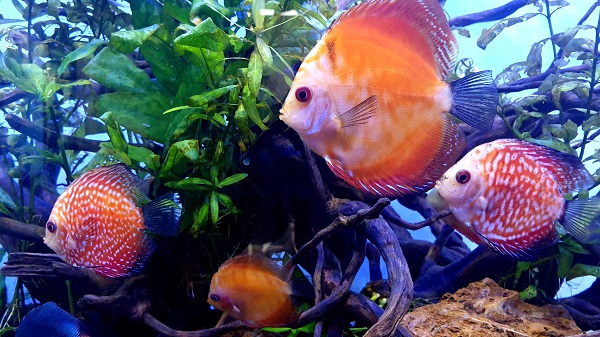Which Aquarium Filter is Best for Discus Fish?
Excess of toxic chemicals that release from rotten diets, fish waste & more decaying matter is highly dangerous for Discus fish so it is very crucial to have these parameters as minimum as possible. Discus fish is very sensitive to water chemistry, & changes in water temperature. They need optimal water conditions for survival. It is mandatory to change partial water on a regular basis to keep water clean, & fresh water also contains minerals that are beneficial for the fish.
If you change partial water on a weekly basis then it is much better for Discus. It will wipe out toxins in the water so your aquarium water quality will improve. Also, it is recommended to add fresh dechlorinated water that has the same temperature so your aquarium water temperature will not change after addition of water. It would be simple if you use a large container & add tap water to the container, dechlorinate it, adjust water pH & hardness, & heat water so that it gets the same temperature as Discus fish tank.
Which Aquarium Filter is Best for Discus Fish?
It is important to keep Discus fish in a large aquarium that has enough space for swimming. Large aquariums help fish grow quickly, & they live happy & healthy lives. Also, the ratio of toxic compounds in small aquariums increases quickly as compared to large aquariums. So, if you want toxic compounds to be in safe limits then go for a large aquarium.
Discus can grow more than eight inches in size so they need large aquariums. If you wish your Discus fish to reach its maximum size, then I would recommend you to keep 4 to 5 Discus fish in 50+ gallons of water.
If you wish to add live plants to your aquarium then they will help in filtration. Live plants can consume ammonia, nitrites & nitrates, & keep water crystal clear.
It is important to use a filter for your Discus aquarium that will clean water, & remove the unwanted chemicals that could be toxic for your fish. Also, maintenance of filters is important because overtime filters need cleaning, & certain media need replacement too. Maintenance will help your filter to run at optimum efficiency. Discus fish needs a filter that contains 2 types of media: mechanical & biological.
Mechanical filter media uses sponges or foams for cleaning water. It removes the solid particles from the water. If fish waste & other decaying matter is not removed on time, then it will rot & release ammonia. So, mechanical filter media will collect all the solid particles, & only allow water to flow into the biological filtration chamber. Heaps of useful bacteria growing on the bio media upon reaction with ammonia, breaks it down into nitrites that are less dangerous than ammonia. When nitrites react with useful bacteria, they are further broken down into nitrates that are less toxic than nitrites. Not all but some bio media can even remove nitrates. Fish can live with nitrates but excess of nitrates is still dangerous for the life of fish.
I would recommend you to use a canister filter for Discus fish. Canister filters are recommended for large aquariums, & they are located outside aquariums. They deal with large volumes of water, & clean water quickly & efficiently. They carry both mechanical & biological media in filter baskets. They let you add heaps of filtration media due to large volumes of baskets. Also, aquarists can customize & add different varieties of filtration media to clean water effectively. If you want to achieve ideal water conditions then canister filters are the best choice. However, canister filters are expensive & bulky, & need storage space outside the aquarium but they will keep your aquarium water chemistry in control. Canister filters use intake & outtake pipes to take water out of the aquarium, & return it to the fish tank. If you are worried about little Discus fish that might accidentally enter filter intake then it is recommended to use a sponge filter on the canister filter intake to avoid small Discus fish from entering it.


Post a Comment